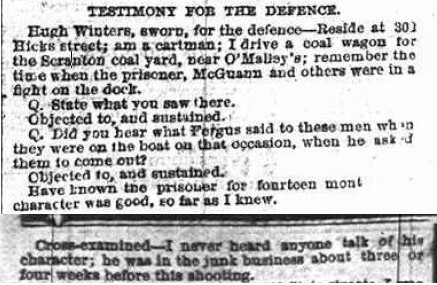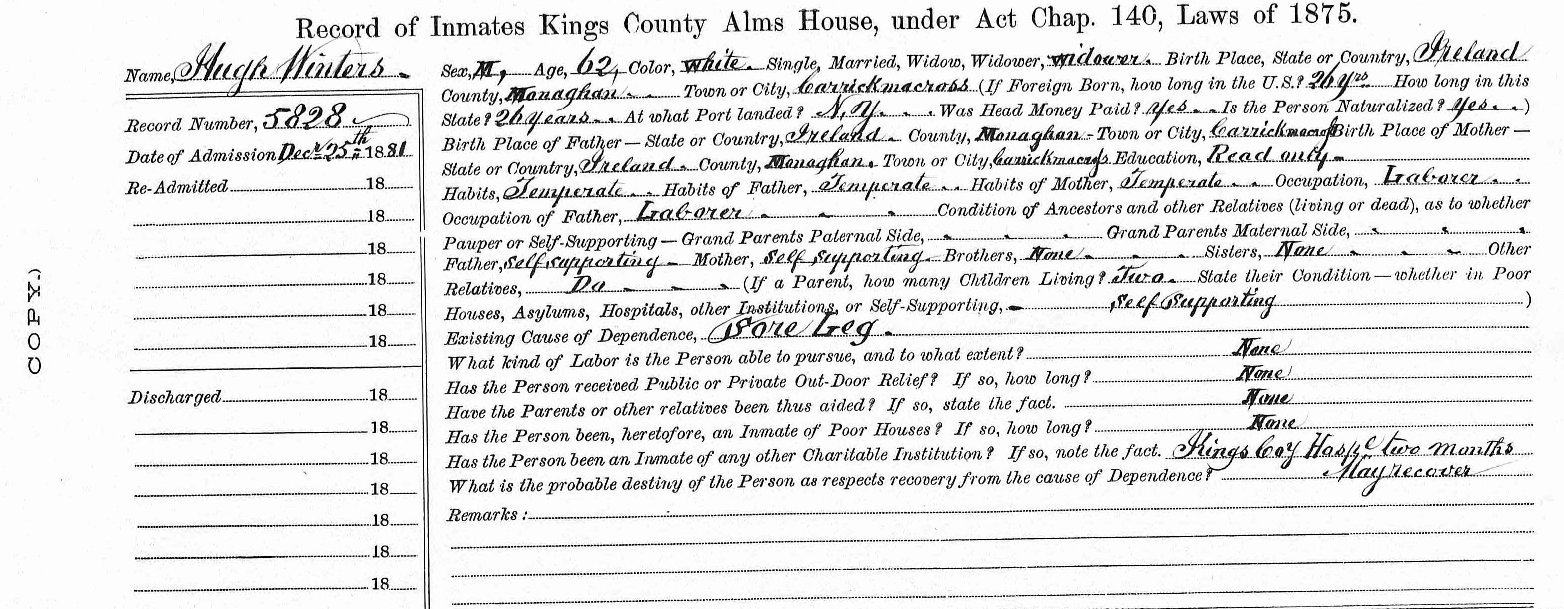1880 United States Census, Brooklyn, Kings County, New York, Defective, Dependent, and Delinquent Classes schedule, Blind Inhabitants, page 586. Ancestry.com. U.S. Federal Census - 1880 Schedules of Defective, Dependent, and Delinquent Classes [database on-line]. Provo, UT, USA: Ancestry.com Operations, Inc., 2010.
Although many additional questions are asked on this schedule, the only ones that were answered were the number and line taken from the population schedule, name, and residence. Based on what I know about Hugh Winters, I will consider what the answers may have been to the unanswered questions.
Is he (or she) self-supporting or partly so?
In the 1880 United States Census, Hugh Winters was enumerated in the household of James and Mary Feenan (son and mother). His occupation was "Laboring." He appears to have been at least partly self-supporting.
1880 United States Census, Brooklyn, Kings County, New York, population schedule, enumeration district 4, page 61C. Ancestry.com. 1880 United States Federal Census [database on-line]. Provo, UT, USA: Ancestry.com Operations Inc, 2010.
Age at which blindness occurred
In 1866, Hugh stated that he drove a coal wagon for the Scranton Coal Co. His blindness must have occurred after he made this statement, since no one would hire a blind person to drive a coal wagon.
Brooklyn Daily Eagle, 23 November 1866
Form of blindness
Supposed cause of blindness
There are many reasons that Hugh could have been blind. Some possible explanations are:
Accident - Perhaps Hugh lost his sight in an accident.
Cataracts - According to "Leading Causes of Blindness" (NIH MedlinePlus, Summer 2008) and "Causes of Blindness and Visual Impairment" (World Health Organization), cataracts are the leading cause of visual impairment in the world. Hugh was born about 1810, so he would have been about 70 years old in 1880. At his age, he may have had cataracts.
Diabetic retinopathy - According to "Facts About Diabetic Eye Disease" (National Eye Institute), diabetic retinopathy is one of the leading causes of blindness in adults, and is the most common diabetic eye disease. "Leading Causes of Blindness" states that it is the most common cause of blindness in adults in the United States. Perhaps Hugh was diabetic and the blood vessels in his retina were damaged.
Glaucoma - According to "Glaucoma Facts and Stats" (Glaucoma Research Foundation), older people have a higher risk of glaucoma, and glaucoma can also cause blindness.
Macular degeneration - According to the American Optometric Association, age-related macular degeneration is the leading cause of vision loss in adults over 50 years of age. Hugh may have experienced macular degeneration. If he did, he may not have been able to see objects clearly, and may have experienced partial blindness,
Trachoma - Hugh may have contracted trachoma, a bacterial infection caused by Chlamydia trachomatis. Trachoma is more likely to spread in areas with poor sanitation ("Hygiene-Related Diseases: Trachoma," Centers for Disease Control and Prevention.) "The Condition of Brooklyn's Streets and Houses" (Brooklyn Daily Eagle, 9 May 1885) reports on the poor sanitary conditions in Brooklyn in the 1880s.
Without more information, it is unclear which of these, if any, was the cause of Hugh's blindness.
Is the person totally blind?
Is the person semi-blind?
On 25 December 1881, Hugh was admitted to the Kings County Alms House. His admission record indicated that he could read, but not could write. His 1880 U.S. census enumeration had indicated that he could not read or write. No mention of blindness was made on the admission record; his cause of admission was a sore leg. He seems to have been able to work in 1880 in spite of being blind. Perhaps he was semi-blind and could read a little. However, if he could see enough to read, he was not supposed to have been listed on the Defective, Dependent and Delinquent schedule. Perhaps he had been able to read before going blind, so he said he could read. Or perhaps his blindness had been temporary, not permanent.
Admission record, Hugh Winters, Kings County Alms House, 25 December 1881. New York State Archives, Albany, New York. New York State Archives; Albany, New York; Census of Inmates in Almshouses and Poorhouses, 1875-1921; Series: A1978; Reel: A1978:46; Record Number: 5828. Available from Ancestry.com. New York, Census of Inmates in Almshouses and Poorhouses, 1830-1920 [database on-line]. Provo, UT, USA: Ancestry.com Operations, Inc., 2011.
Has this person ever been an inmate of an institution for the blind? If yes, give name of such institution.
On the above admission record, when asked if he had been an inmate of any other charitable institution, Hugh stated that he had been in the Kings County Hospital for two months. He did not mention any institutions for the blind, so the answer to this question appears to have been "No."
Date of his or her discharge
Not applicable.
Is this person also insane?
Is he (or she) also idiotic?
Is he (or she) also a deaf-mute?
Hugh did not appear on the list of Deaf-Mutes, Insane, or Idiots, so the answer to these questions appears to have been "No."





No comments:
Post a Comment